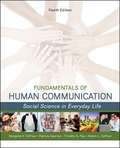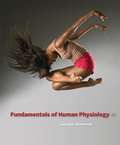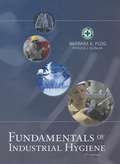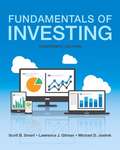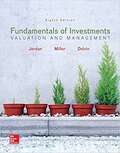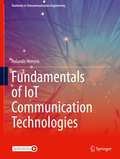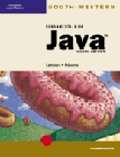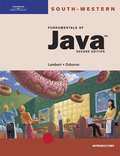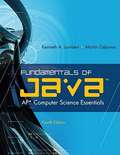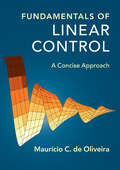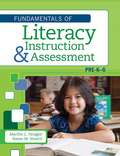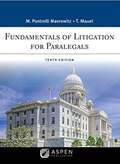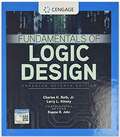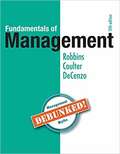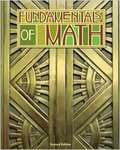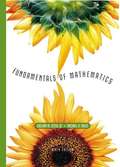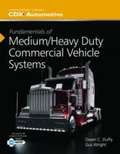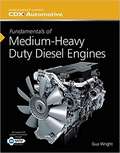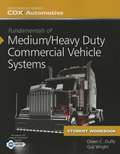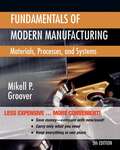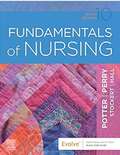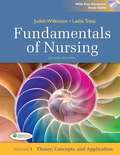- Table View
- List View
Fundamentals of Human Communication: Social Science in Everyday Life, Fourth Edition
by Melvin L. Defleur Patricia Kearney Margaret H. Defleur Timothy G. PlaxThis book presents the basic theoretical and practical concepts of the human communication process. DeFleur uses a multidisciplinary approach, with a balance of innovative and traditional perspectives to give students the tools to communicate effectively in the workplace and in everyday situations.
Fundamentals of Human Physiology (Fourth Edition)
by Lauralee SherwoodThis edition provides scientifically sound coverage of the fundamental concepts of physiology and incorporates pedagogical features that make it interesting and comprehensible.
Fundamentals of Industrial Hygiene
by Barbara Plog Patricia QuinlanThis edition of Fundamentals of Industrial Hygiene presents original new chapters on Particulate Matter (Chapter 8), Ionizing Radiation (Chapter 11), Personal Protective Equipment (Chapter 23), Environmental Health and Safety (Chapter 28), Government Regulations (Chapter 30), and International Developments in Occupational Safety and Health (Chapter 31). All other chapters have been extensively updated and revised. The primary purpose of this book is to provide a reference for those who have either an interest in or a direct responsibility for the recognition, evaluation, and control of occupational health hazards. Thus, it is intended to be of use to industrial hygienists, industrial hygiene students, physicians, nurses, safety personnel from labor and industry, labor organizations, public service groups, government agencies, and manufacturers. Others who may find this reference helpful include consultants, engineers, architects, lawyers, and allied professional personnel who work with those engaged in business, industry, and agriculture. It is hoped that this book will be of use to those responsible for planning and carrying out programs to minimize occupational health hazards.
Fundamentals of Investing (The Pearson Series in Finance)
by Lawrence J. Gitman Scott B. Smart Michael D. JoehnkThis thirteenth edition of Fundamentals of Investing provides the information and guidance needed by individual investors to make informed decisions and to achieve their investment goals. This book meets the needs of professors and students in the first investments course offered at colleges and universities, junior and community colleges, professional certification programs, and continuing education courses. <P><P> Focusing on both individual securities and portfolios, Fundamentals of Investing explains how to develop, implement, and monitor investment goals after considering the risk and return of different types of investments. A conversational tone and liberal use of examples guide students through the material and demonstrate important points. The text provides a firm foundation for learning by first describing the overall investment environment, including the various investment markets, information, and transactions. Next, it presents conceptual tools needed by investors--the concepts of return and risk and the basic approaches to portfolio management. It then examines the most popular types of investments--common stocks, bonds, and mutual funds. The final section of the book focuses on derivative securities--options and futures--which require more expertise.
Fundamentals of Investments: Valuation and Management
by Miller Jordan DolvinFundamentals of Investments focuses on students as investment managers, giving them information to act on by placing theory and research in the proper context. The text offers a balanced, unified treatment of the four main types of financial investments―stocks, bonds, options, and futures. Topics are organized in a way that makes them easy to apply―whether to a portfolio simulation or to real life―and supported with hands-on activities. Then, resources within Connect help students solve financial problems and apply what they’ve learned. Jordan’s managerial perspective and superior pedagogy combine with a complete digital solution to help students achieve higher outcomes in the course. <p><p> Connect is the only integrated learning system that empowers students by continuously adapting to deliver precisely what they need, when they need it, and how they need it, so that your class time is more engaging and effective.
Fundamentals of IoT Communication Technologies (Textbooks In Telecommunication Engineering Ser.)
by Rolando HerreroThis textbook explores all of the protocols and technologies essential to IoT communication mechanisms. Geared towards an upper-undergraduate or graduate level class, the book is presented from a perspective of the standard layered architecture with special focus on protocol interaction and functionality. The IoT protocols are presented and classified based on physical, link, network, transport and session/application layer functionality. The author also lets readers understand the impact of the IoT mechanisms on network and device performance with special emphasis on power consumption and computational complexity. Use cases – provided throughout – provide examples of IoT protocol stacks in action. The book is based on the author’s popular class “Fundamentals of IoT” at Northeastern University. The book includes examples throughout and slides for classroom use. Also included is a 'hands-on’ section where the topics discussed as theoretical content are built as stacks in the context of an IoT network emulator so readers can experiment.
Fundamentals of Java: Comprehensive Course
by Kenneth Lambert Martin OsborneCompletely revised and updated, Fundamentals of Java: Comprehensive Course covers all of the AP requirements for Computer Science Exams A and AB. By taking a multilevel approach to teaching Java, this text is suitable for a wide range of students, from beginners to those ready for advanced data structures. Since it is non-software specific, it can be used with any Java program compiler, including Borland, Sun Microsystems, Symantec and others.
Fundamentals of Java: Introductory Course (2nd Edition)
by Kenneth Lambert Martin OsborneCompletely revised and updated, Fundamentals of Java: Introductory Course, Second Edition now covers all of the AP requirements for Computer Science Exam A. Clear, practical explanations guide students through even the most complex programming topic. Since it is non-software specific, it can be used with any Java program compiler, including Borland, Sun Microsystems, Symantec and others.
Fundamentals of JavaTM: AP® Computer Science Essentials
by Kenneth Lambert Martin OsborneFundamentals of Java#xE2;#x1E;#xA2;: AP* Computer Science Essentials, Fourth Edition covers all of the AP requirements for Computer Science Exam A.
Fundamentals of Linear Control: A Concise Approach
by Maurício C. De OliveiraTaking a different approach from standard thousand-page reference-style control textbooks, Fundamentals of Linear Control provides a concise yet comprehensive introduction to the analysis and design of feedback control systems in fewer than 400 pages. The text focuses on classical methods for dynamic linear systems in the frequency domain. The treatment is, however, modern and the reader is kept aware of contemporary tools and techniques, such as state space methods and robust and nonlinear control. Featuring fully worked design examples, richly illustrated chapters, and an extensive set of homework problems and examples spanning across the text for gradual challenge and perspective, this textbook is an excellent choice for senior-level courses in systems and control or as a complementary reference in introductory graduate level courses. The text is designed to appeal to a broad audience of engineers and scientists interested in learning the main ideas behind feedback control theory. Provides a comprehensive yet concise introduction to the analysis and design of feedback control systems, with the required content presented in less than 400 pages, versus the typical thousand-page standard control textbooks presently available. Features fully worked examples and richly illustrated chapters, complemented by an extensive set of homework problems with activities in MATLAB®, allowing students to gain valuable hands-on experience by solving select problems which span across chapters. Offers a complete teaching package on the companion website that include all MATLAB® scripts to generate all figures and tables in the book and a complete solutions manual.
Fundamentals of Literacy Instruction and Assessment, Pre-K-6
by Martha C. Hougen Susan M. SmarttHougen (College and Career Readiness Initiative: English/Language Arts Faculty Collaborative, U. of Texas-Austin) and Smartt (National Comprehensive Center for Teacher Quality, Vanderbilt U. ) compile 17 chapters by education scholars and researchers from the US who introduce pre-service teachers and parents to teaching fundamental literacy skills in students in pre-K through sixth grade. Chapters are organized by the main components of reading instruction and the typical development of skills, from phonological awareness to fluency to writing, and include recommended assessment practices, in addition to chapters on literacy in the disciplines and current laws, policies, initiatives, and response to intervention. They end with chapters on putting it all together and tips for becoming an effective teacher. They refer to the most recent standards, including Common Core State Standards, the International Reading Association Standards for Reading Professionals, and The International Dyslexia Association Knowledge and Practice Standards for Teachers of Reading. Annotation ©2012 Book News, Inc. , Portland, OR (booknews. com)
Fundamentals of Literature for Christian Schools
by Donna L. Hess June CatesThis book interprets six topics in a biblical perspective: conflict, character, theme, structure, point of view and moral tone.
Fundamentals of Litigation for Paralegals (Aspen Paralegal Series)
by Thomas A. Mauet Marlene Pontrelli MaerowitzFundamentals of Litigation for Paralegals, Tenth Edition, provides a complete understanding of the entire litigation process from the moment the client walks into the office, through trial and post-judgment, including settlements and alternative forms of resolution. <p><p>Popular and widely respected, authors Maerowitz and Mauet present a clear and balanced treatment of litigation and accessible explanations of the rules. Well-suited to a wide range of teaching approaches, the timely Tenth Edition reflects the practice of litigation today. <p><p> New to the Tenth Edition: <p> The most current updates to Federal Rules of Civil Procedure <p>New developments in e-discovery integrated into the text <p>Updated questions designed to assist review of major concepts <p>Meticulous revisions and streamlined text throughout <p>A companion workbook revised to include additional assignments for each chapter <p>Professors and students will benefit from: <p> A balanced and reader-friendly presentation <p>Accessible and cogent discussion of rules and procedures <p>A flexible organization that lends itself to a variety of teaching objectives <p>A comprehensive design for learning that includes boldface terms with definitions in the margins, wealth of examples and sample forms, checklists, chapter overviews and summaries, and helpful review and research questions <p>A litigation file with realistic examples of motions, pleadings, and discovery requests. <p>Short, edited cases added to each chapter, with questions, for follow-up discussion on key topics <p>A companion workbook, available as a download, with review questions, case scenarios, and practice forms
Fundamentals of Logic Design
by Jr. Larry L. Kinney Eugene B. John Charles H. RothMaster the principles of logic design with the exceptional balance of theory and application found in Roth/Kinney/John's FUNDAMENTALS OF LOGIC DESIGN, ENHANCED, 7th Edition. This edition introduces you to today's latest advances. The authors have carefully developed a clear presentation that introduces the fundamental concepts of logic design without overwhelming you with the mathematics of switching theory. Twenty engaging, easy-to-follow study units present basic concepts, such as Boolean algebra, logic gate design, flip-flops and state machines. <p><p>You learn to design counters, adders, sequence detectors and simple digital systems. After mastering the basics, you progress to modern design techniques using programmable logic devices as well as VHDL hardware description language.
Fundamentals of Management: Essential Concepts and Applications, Student Value Edition
by Stephen Robbins David A. De Cenzo Mary Coulter<p>Fundamentals of Management is the most engaging and up-to-date introduction to management resource on the market today. Covering the essential concepts of management, it provides a solid foundation for understanding the key issues and offers a strong, practical focus, including the latest research on what works for managers and what doesn't. <p>The 10th Edition has been updated with the latest coverage on hot topics such as sustainability, holacracy, the sharing economy, gamification, data analytics/big data, BYOD (bring your own device), and wearable technology. Engaging and fun videos and exercises motivate readers and give them the practice they need to become successful managers.</p>
Fundamentals of Math
by Ron Tagliapietra Kathy Kohler Hal C. Oberholzer IIFundamentals of Math covers many basic but important concepts, some of which you have studied in earlier math courses. At the same time, it lays the foundation for the types of higher math you will learn in high school and beyond.
Fundamentals of Mathematics
by Wade Ellis Denny BurzynskiFundamentals of Mathematics is a work text that covers the traditional topics studied in a modern prealgebra course, as well as topics of estimation, elementary analytic geometry, and introductory algebra. It is intended for students who have had a previous course in prealgebra, wish to meet the prerequisite of a higher level course such as elementary algebra, and need to review fundamental mathematical concepts and techniques.
Fundamentals of Mathematics (Ninth Edition)
by William M. Setek Michael A. GalloThis text covers all the fundamentals of Mathematics and contains abundant examples with systematic step-by-step solutions.
Fundamentals of Medium-Heavy Duty Commercial Vehicle Systems
by Gus Wright Owen C. DuffyNIMAC-sourced textbook
Fundamentals of Medium/Heavy Duty Commercial Vehicle Systems: Student Workbook
by Cdx AutomotiveThis Student Workbook contains exercises to reinforce what you will learn in both Fundamentals of Medium/Heavy Duty Commercial Vehicle Systems and the classroom. The Student Workbook is designed to encourage critical thinking and aid comprehension through a variety of exercises in each chapter, including: <P><P>ASE-Type Questions - Test your critical thinking skills and prepare for certification exams. <P><P>Skill Drill Activities - Test your skills with photo jumbles and caption fill-ins. Place photos in the correct order to test your knowledge of a skill and fill-in the captions to ensure that you know all the details of each step. <P><P>Labeling - Master visual recognition with labeling activities that test your knowledge of automotive tools, parts, and systems. <P><P>And More- Matching, multiple choice, true/false, fill-in-the-blank, and crossword puzzles.
Fundamentals of Medium/Heavy Duty Diesel Engines
by Cdx Automotive Staff Gus WrightBased on the 2014 National Automotive Technicians Education Foundation (NATEF) Medium/Heavy Truck Tasks Lists and ASE Certification Test Series for truck and bus specialists, Fundamentals of Medium/Heavy Duty Diesel Engines is designed to address these and other international training standards. The text offers comprehensive coverage of every NATEF task with clarity and precision in a concise format that ensures student comprehension and encourages critical thinking. <p><p> Fundamentals of Medium/Heavy Duty Diesel Engines describes safe and effective diagnostic, repair, and maintenance procedures for today’s medium and heavy vehicle diesel engines, including the most current, relevant, and practical coverage of: • HD-OBD emission diagnostics • Common rail injection systems • Exhaust after treatment systems, including diesel particulate filters, selective catalyst reduction (SCR), and lean NOx traps (LNT) • Variable geometry and series turbocharging • Exhaust gas recirculation • Engine braking • Major engine OEM-specific coverage of fuel, air induction, and diagnostic systems • Electronic signal processing and sensor technology Additional features include: • Up-to-date NATEF coverage • Support of ASE certification test preparation for diesel engine, medium-heavy truck, and bus test series • A clear, accessible writing style • Reinforcement of concepts learned • Application to real-world practice • A wealth of photographs, illustrations, and step-by-step explanations with visual summaries
Fundamentals of Modern Manufacturing: Materials, Processes, and Systems,Fifth Edition
by Mikell R GrooverFundamentals of Modern Manufacturing: Materials, Processes, and Systems, 5th Edition, is designed for a first course or two-course sequence in Manufacturing at the junior level in Mechanical, Industrial, and Manufacturing Engineering curricula. Given its coverage of engineering materials, it is also be suitable for Materials Science and Engineering courses that emphasize Materials Processing. In addition, it may be appropriate for technology programs related to the preceding engineering disciplines. Most of the books content focuses on Manufacturing Processes (about 65% of the text), but it also covers Engineering Materials and Production Systems.
Fundamentals of Nursing
by Amy Hall Patricia A. Potter Anne Griffin Perry Patricia StockertLearn the concepts and skills you need to provide excellent nursing care! Fundamentals of Nursing, 10th Edition prepares you to succeed as a nurse by providing a solid foundation in critical thinking, clinical reasoning, nursing theory, evidence-based practice, and patient-centered care in all settings. <p><p>With illustrated, step-by-step guidelines, this book makes it easy to learn important skills and procedures. Care plans are presented within a nursing process framework, and case studies show how to apply concepts to nursing practice. <p><p>From an expert author team led by Patricia Potter and Anne Perry, this bestselling nursing textbook helps you develop the understanding and clinical reasoning you need to succeed in the classroom and in your career.
Fundamentals of Nursing - Vol 1: Theory, Concepts, and Applications
by Judith Wilkinson Leslie TreasTeaching students to begin to think like a nurse from the very first day Fundamentals of Nursing, 2nd Edition is a groundbreaking, two-volume text written in a student friendly, conversational style.
